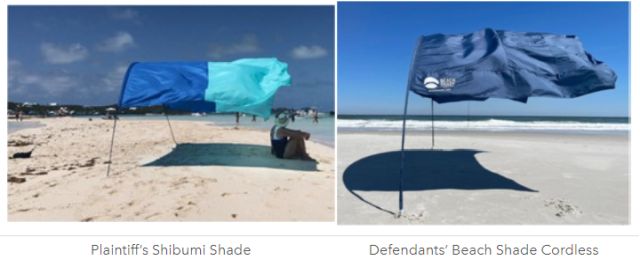This is part of a series of articles discussing recent orders of interest issued in IP cases by the United States District Courts in the Southeast.
In Spin-balls, LLC v. Five Below, Inc., No. 8:23-cv-02743-MSS-AEP (M.D. Fla. Dec. 5, 2023), Judge Scriven granted Plaintiff Spin-balls, LLC's ex parte motion for a temporary restraining order against Defendant Five Below, Inc. for patent, trademark, and trade dress infringement.
Spin-balls, a Florida toy company, filed a complaint against Five Below, a discount store chain, and other defendants, alleging patent, trademark, and trade dress infringement as well as unfair competition. In its complaint, Spin-balls alleged that Five Below's Magic Cube toy infringed Spin-balls' U.S. Patent Nos. 10,918,964 and 11,660,547 and that Five Below's LED Poi Balls toy infringed Spin-balls' U.S. Patent Nos. 8,926,331 and 9,333,398. Spin-balls also alleged that Five Below's use of the mark "Calmagami" was confusingly similar to Spin-balls' registered mark KARMAGAMI® and that Five Below's product packaging infringed Spin-balls' KARMAGAMI®, SHASHIBO®, and SPINBALLS" trade dress.
The same day Spin-balls filed its complaint, it also moved for a temporary restraining order to enjoin Five Below from manufacturing, distributing, offering for sale, and selling its Magic Cube toy.
The court granted Spin-balls' motion, finding that Spin-balls had demonstrated that "it will likely prevail on its claims of patent infringement" based on its detailed claim charts comparing the claims of the patents to the Magic Cube toy. The court also found that in the absence of an injunction, Five Below would continue selling the Magic Cube, posing significant safety risk to children "because the magnets may be readily dislodged from their external recesses [of the MagicCube] and pose a choking hazard," and "leading to low customer satisfaction in the broader market for magnetic toys," and thus harming Spin-Balls' reputation and the market itself. The court also determined that the balance of harms favored Spin-balls because it was a relatively small company reliant on sales of its flagship SHASHIBO® product during the holiday season and Five Below, by comparison, was an over $10 billion dollar company with thousands of products other than the Magic Cube. Finally, the court found that the public interest would be served by a temporary restraining order to prevent customer confusion, deception, and safety risk to children due to the choking hazard posed by "the poorly-secured magnets of the Magic Cube."
The court's temporary restraining order prohibited Five Below and the other defendants from offering for sale, selling, and importing the Magic Cube from December 4, 2023, through January 8, 2024, "to avoid irreparable harm to Plaintiff during the critical holiday selling period."
In Lexmark International Inc. v. Universal Imaging Industries, LLC, No. 8:18-cv-1047-WFJ-AEP (M.D. Fla. Dec. 14, 2023), Judge Jung denied Plaintiff Lexmark International Inc.'s and Defendant Universal Imaging Industries, LLC's ("UII") respective Daubert Motions in a patent infringement case.
Denial of UII's Daubert Motion to Exclude the Opinions of Lexmark's Damages Expert
UII moved to exclude the opinions of Lexmark's damages expert, arguing that (1) she "failed to apportion her damage opinions between the asserted patented features and all other features of the accused products"; (2) her "efforts to apply the entire market value as an exception to apportionment is (sic) not supported by the facts of this case"; and (3) her "opinions on lost profits are inconsistent with the law to establish lost profits in that she does not take into account the differences between the two products being offered."
In denying UII's motion, the court responded to each argument in turn. First, the court found that "a material issue of fact exists as to whether each of UII's sales directly caused Lexmark to lose a customer." The court found that a jury could reasonably find, based on the record, that Lexmark satisfied each of the Panduit factors for lost profits, meaning that Lexmark's expert's analysis may properly incorporate apportionment principles. The court also found that the expert's reasonable-royalty analysis properly applied "a form of apportionment." Second, the court found that Lexmark's expert did not directly apply the entire market value theory as an exception to apportionment, and even if she had, it is unclear at this stage why the exception would not apply. Finally, the court notes that it remains unclear whether Lexmark's expert failed to account for the differences between the two products or even if a distinction is material to damages.
Denial of Lexmark's Daubert Motion to Exclude the Opinions of UII's Rebuttal Damages Expert
Lexmark moved to exclude the opinions of UII's rebuttal damages expert because his "opinions are nothing more than impermissible legal conclusions based on unsound methodology." In denying Lexmark's motion, the court noted that UII's expert offered "far more than mere legal opinion" and disagreed that his methodology was unsound. But, according to the court, if the expert attempts to argue at trial that Lexmark's expert's opinions are legally insufficient, the court noted that it would "prohibit such testimony and properly instruct the jury to disregard" it.
In Natera, Inc. v. NeoGenomics Labs., Inc., No. 1:23-cv-00629-CCE-JLW (M.D.N.C. Dec. 27, 2023) Chief Judge Eagles granted Plaintiff Natera, Inc.'s motion for preliminary injunction against Defendant NeoGenomics Laboratories, Inc. and denied NeoGenomic's motion for discovery sanctions against Natera in a patent infringement case.
The Technology
Natera and NeoGenomics are both research-focused healthcare companies that operate in the oncology testing industry with products that can be used for earlier detection of cancer relapse. The suit involves Natera's U.S. Patent Nos. 11,519,035 and 11,530,454. The '035 patent provides methods and compositions for amplifying targeted genetic material (i.e., increasing the number of copies of the targeted material such as DNA), while reducing amplification of non-targeted material. The '454 patent provides methods, systems, and a computer readable medium for detecting variations in genetic material indicative of disease or disease recurrence. Natera uses its patented methods in a product marketed under the brand name Signatera; it claims NeoGenomics' product, RaDaR—used in clinical cancer research since April 2020 and commercially available since March 2023—infringes both patents.
Both parties' products operate in the field of molecular residual disease ("MRD") testing, which detects trace amounts of tumor DNA molecules in the body after treatment. Early detection of MRD supports better patient outcomes because it can determine whether tumor cells remain in a patient's body even after the tumor has become undetectable in radiographic imaging or clinical examination. The products work by identifying fragments of DNA in the bloodstream, known as cell-free DNA (cfDNA), and specifically amplifying the cfDNA created by cancerous cells, known as circulating tumor DNA (ctDNA) to indicate the efficacy of cancer treatments and associated risks of recurrence.
Natera is the MRD assay market leader, having 74% of the total market share for both tumor-informed or tumor-naïve MRD tests. RaDaR is the only other tumor-informed MRD test, while other companies compete in the tumor-naïve tests market.
Motion for Preliminary Injunction
The court granted Natera's motion for preliminary injunction, finding Natera demonstrated a likelihood of success that NeoGenomics used the method claimed in the '035 patent and thus infringed. In granting the preliminary injunction, the court rejected NeoGenomics's invalidity challenges, as follows:
- Obviousness: The court rejected the argument that it would have been obvious to modify a prior art reference to use cfDNA for cancer detection, finding instead that a skilled person would not have been motivated to use cfDNA because there were many well-known barriers to using cfDNA, and these challenges also presented obstacles to successfully amplifying and sequencing ctDNA with precision during the relevant time period.
- Written Description: The court rejected the argument that the patent lacked examples of the claimed process, finding that the perfunctory one-paragraph argument did not raise a substantial question of validity.
- Inventorship: The court rejected the argument that changes to inventorship during the patent prosecution "appear dubious," finding that NeoGenomics failed to show that an inventor is missing or there is any issue with any specific inventor.
- Patent Eligible Subject Matter: The court declined to consider the subject matter argument because NeoGenomics attempted to incorporate by reference an argument from a separate motion in attempt to circumvent the court's word limits.
The court further found a likelihood of irreparable harm because NeoGenomic is Natera's only competitor in the tumor-informed MRD market, RaDaR is predicted to have significant growth in the relevant market, and there is risk that Natera will lose out on potential customers, profits, business relationships, and clinical opportunities absent an injunction. The court also found the balance of equities weighs in favor of an injunction because Signatera is important to Natera's economic success, while NeoGenomics's economic success is not intimately tied to RaDaR's success because NeoGenomics derives revenues from over 600 tests for cancer diagnostics. Lastly, the court found that enforcing patent rights always serves the public interest, but the public interest does not support enjoining ongoing treatments, research, and clinical studies that use RaDaR. Accordingly, the court granted Natera's motion for a preliminary injunction, enjoining NeoGenomics' from making, using, importing, selling or offering to sell the accused products while exempting existing patients, research, and clinical studies that use the RaDaR product.
Motion for Sanctions
NeoGenomics previously moved for an order to compel Natera to answer certain interrogatories. In denying the motion, the Court noted that further noncompliance by Natera could ripen into a motion for sanctions under Federal Rule of Civil Procedure 37. See https://www.finnegan.com/en/insights/articles/southeast-litigation-update-september-and-october-2023.html . NeoGenomics thereafter moved for such sanctions.
Denying NeoGenomics's motion, the court found that, while Natera's response to an interrogatory about conception date shifted from "no later than April 21, 2014," in its original response to "April 21, 2015," in response to a court order, and later to "June 20, 2014," NeoGenomics was not surprised in substance, and that the latest amendment to its answer was harmless at this stage. The court also found that the "ordinary and less drastic consequences available when a litigant makes inconsistent statements" can meet the need to deter Natera's "lack of diligence and gamesmanship," including, for example, proffering these shifting factual assertions as evidence to undermine Natera's claim of earlier conception date.
In OnAxis Franchising Group, LLC v. Harod, No. 1:23-cv-4835-MHC (N.D. Ga. Dec. 28, 2023), Judge Cohen granted Plaintiff OnAxis Franchising Group's motion for a preliminary injunction as to its breach of contract claims but denied the motion as to OnAxis's trademark infringement claims.
OnAxis engages in franchising the Green Home Solutions® System, a proprietary system of "environmentally friendly cleaning services." The GHS brand includes not only the proprietary products, procedures, and training courses, but also registered trademarks, service marks, logos, and trade dress.
Defendant Harod (one of two defendants) entered into two franchise agreements to operate a GHS franchise in the "Protected Territories," i.e., nineteen zip codes in Southern California. The franchise agreements contain non-compete covenants, which probit franchisees from engaging in a competing business within the "Protected Territories" for two years after termination of the agreement. Harod subsequently terminated the franchise agreements and operated a competing business, BH Environmental, offering several of the same services it offered as a franchisee of OnAxis in the Protected Territories. Harod, however, continued to operate a Yelp business webpage listing, which was registered to GHS, but changed the listing name to BH Environmental.
Finding that there is a substantial likelihood of a violation of the non-compete covenants in the franchise agreements and that the remaining preliminary injunction factors favored OnAxis, the court preliminarly enjoined Harod from operating the competing BH Environmental and any competitive business in the Protected Territories for two years.
The court, however, denied OnAxis's motion for a preliminary injunction based on its trademark claims. While there was no dispute that OnAxis holds valid trademarks for the GHS Marks, OnAxis did not allege that Defendants, through their operation of BH Environmental, used the GHS Marks or substantially similar marks after the termination of the franchise agreements. Instead, OnAxis alleged that BH Environmental used the same Yelp page registered to GHS and that, as a result, customer reviews of GHS were attributed to BH Environmental and that other social media websites continued to associate BH Environmental and GHS. OnAxis also alleged that Defendants leveraged and derived "benefits from the GHS Marks on third-party sites associated with GHS and this conduct alone constitutes copyright infringement because it would cause 'likelihood of confusion.'"
At the preliminary injunction hearing, OnAxis further argued that BH Environmental's webpage used a substantially similar color scheme to its own webpage. Notably, OnAxis did not argue through its briefing that the website color schemes constituted trademark infringement. The court found that OnAxis failed to allege a single act where BH Environmental used the GHS Marks to promote its business or that BH Environmental failed to disassociate from GHS. Left with only a single non-conclusory allegation that the GHS Marks "remained on" BH Environmental's Yelp reviews and social media sites, the court found that this allegation—customer reviews containing a trademark, with nothing else—does not constitute trademark infringement. As a result, the court denied OnAxis's motion for preliminary injunction as to its trademark infringement claims.
In Shibumi Shade, Inc. v. Beach Shade LLC, No. 5:23-cv-00297-FL (E.D.N.C. Dec. 29, 2023), Judge Flanagan granted in part Plaintiff Shibumi Shade, Inc.'s motion for preliminary injunction against Defendants Beach Shade LLC and Matthew Finneran in a design and utility patent infringement case. The court also denied Beach Shade's motion to dismiss based on prosecution history estoppel and violation of the all-elements rule.
When determining whether to grant a preliminary injunction, the court considers four factors: whether plaintiff is likely to succeed on the merits, whether plaintiff is likely to suffer irreparable harm in the absence of preliminary relief, whether the balance of equities tips in plaintiff's favor, and whether such injunction is in the public interest.
The patent litigation involved three patents—two design and one utility—that cover different aspects of Shibumi's shading product, the Shibumi Shade. Pictures of the Shibumi Shade and the accused Beach Shade Cordless are shown below for side-by-side comparison:

Both products consist, in effect, of an arched frame, a canopy, and a carrying case, yet the products differ in their respective canopy designs, the method of attachment to the frame, and the method of anchoring the apparatus to the ground. Those differences, the court observed, are especially difficult to discern and not easily distinguishable from the patented design. In sum, the court found that an ordinary observer, viewing the Beach Shade Cordless as a whole, likely would be deceived into believing the Beach Shade Cordless is the same as the Shibumi's patented design.
While Beach Shade highlighted several differences between the Shibumi Shade and the Beach Shade Cordless, the court rejected them because the analysis only considers whether the accused product is the same as the patented design, not whether both parties' products are the same.
Beach Shade next argued both of Shibumi's design patents are invalid because the patented design is primarily functional. Whether a design is dictated by its function is based on the following five factors:
- whether the protected design represents the best design;
- whether alternative designs would adversely affect the article's utility;
- the existence of concomitant utility patents;
- whether any advertisements tout features of the design as having specific utility; and
- whether any element of the design or overall appearance is not clearly dictated by function.
Reviewing the factors, the court found only the existence of concomitant utility patents weighs in favor of Beach Shade and the remaining factors all weigh in favor of Shibumi. For example, the court found first two factors weigh in favor of Shibumi because there is no homogenous preference among consumers, so the patents do not necessarily cover the best design, nor would alternative designs adversely affect the utility of the article. The court also found that Shibumi's advertising generally does not tout any particular design features, and instead emphasize the function of the product as a whole. And for the last factor, the court found Beach Shade provided only conclusory statements. Accordingly, the court found the design patents not invalid.
Addressing the remaining three factors for a preliminary injunction, the court found that evidence clearly established both a loss of customers and increased production costs (indicating irreparable harm), that the balance of equities favored protecting Shibumi, and that the public's interest is best served by protecting the rights of a valid patent, when an injunction in the niche market would not have broad-reaching effects that negatively impact the public's interest. Accordingly, the court granted-in-part Shibumi's motion for preliminary injunction, enjoining Beach Shade from continuing manufacture, importation, use, sale, and offers to sell the Beach Shade Cordless product.
The court then addressed Beach Shade's motion to dismiss based on prosecution history estoppel and violation of the all-elements rule. For prosecution history estoppel, the court noted that while it may be appropriate in some instances to consider this defense on a motion to dismiss, Beach Shade failed to provide the entire prosecution history, rendering any decision on the scope of the claims premature. For the all-elements rule violation, the court noted that such a determination of no infringement must be premised upon a proper claim construction. Finding such a task is inappropriate at the pleading stage, the court denied Beach Shade's motion to dismiss.
Endnotes
Sonja W. Sahlsten is board certified in intellectual property by The Florida Bar and has a particular interest in IP cases issued by the United States District Court for the Middle District of Florida.
The content of this article is intended to provide a general guide to the subject matter. Specialist advice should be sought about your specific circumstances.





